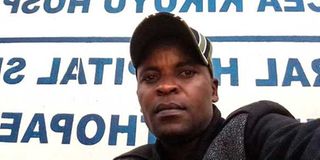Father appeals for help after wife's rare birth to triplets, two of them conjoined

Mr Francis Kinyua, the father of conjoined twins born in Meru on November 26, 2022.
As Francis Kinyua paced the corridors of Kenyatta National Hospital (KNH) on Saturday, he was experiencing mixed emotions – joy and distress.
On Friday, his wife, Evelyn Njoki, delivered triplets: a boy and two girls who were conjoined in such a way that torsos are merged but they have two separate heads. In medical terms, the rare scenario is called dicephalic parapagus.
This was the second time Mr Kinyua was getting conjoined offspring. In October 2007, his first wife had delivered a baby conjoined with an undeveloped twin – often called a parasitic twin.
The dominant twin underwent separation surgery but she developed complications that left her paralysed. “I do not know what to do.
I am stressed and confused. As we speak, my 15-year-old daughter is in need of Sh700,000 for an operation because she cannot walk. She developed a wound in 2009 after the operation but it healed this year,” an overwhelmed Kinyua told Sunday Nation on the phone.
He says the first wife fled when the girl’s medical condition became more demanding.
“I remarried last year after raising my daughter alone for more than 10 years. We were expecting triplets on December 23. However, when she went to Nyambene Hospital, she had to undergo a Caesarean section earlier,” Mr Kinyua said.
He appealed to well-wishers to help him raise money for his firstborn daughter and the triplets’ medical care. His phone number, which he allowed us to publish, is 0725081717.
Speaking from her hospital bed in Meru, Ms Njoki said ultrasound scans done at six months of her pregnancy indicated that she was carrying healthy triplets.
“When I came to the clinic at six months, I was informed that the babies were okay. I am now appealing to well-wishers to come to my aid because I cannot afford the medical costs needed.”
Dr Ephraim Ndumba, a medical officer at Nyambene Level Four Hospital, said the girls were in stable condition.
Dr Wachira Githu, the medical officer for Igembe South, said the triplets were referred to KNH for specialised care. “There is a need to evaluate conjoined girls to establish whether they can be separated. They will seek to establish whether the heart, stomach and other organs are shared,” said Dr Githu, adding that such cases are rare and that KNH recorded only one incident last year.
“Such cases are referred to as biological accidents but can also be a result of genetic deformity. In this case, we suspect a genetic deformity because the father has sired conjoined twins in the past.”
Dr Githu said a genetic deformity can be established through a sperm analysis.





